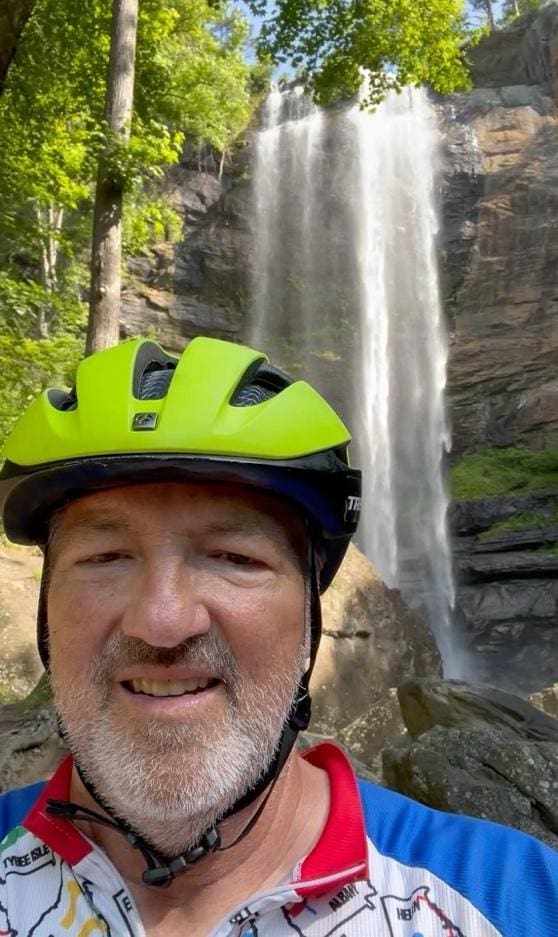By Kirk McCarley
In the developed world, many of us take water for granted. True, we are impacted by droughts and shortages, especially in more arid regions, but for the most part, when we turn on a faucet, we can quench our thirst and wash our hands, or for that matter, our entire bodies.
Water can be peaceful, refreshing, and magnetic. It is a primary attraction for commerce and recreation.
We must respect it.
Earlier this year, I had the opportunity to cycle across Northern Georgia through always rolling and sometimes quite steep terrain. Views during that journey were breathtaking and enjoyable when not slowed to a near standstill by an incline of 12%, 13%, or even more!
A side benefit of the excursion was a short detour to Toccoa Falls near the South Carolina border. A renewing moment marked by a cooling mist was much welcomed on a day that had grown quite warm by mid-morning.

Beautiful, as it were, I was not aware of the history of this landmark.
Early on the morning of November 6, 1977, several factors led to the failure of an upstream dam, including heavy rain. That morning, the gentle stream into which the falls emptied was suddenly and unexpectedly converted into a raging current. Toccoa Falls College is adjacent to this landmark. College buildings and housing were in the pathway of newly forged waterways.
Property destruction was significant, yet even worse, the catastrophe claimed 39 lives. Former Georgia Governor and then President Carter responded quickly to the tragedy, laying the groundwork for the creation of a committee on dam safety that led to the inspection of over 9,000 dams throughout the US.
On the morning of this past July 4, a storm system centered itself in the Texas Hill Country, just west of Kerrville, Texas. Forecasters had earlier issued watches for a weather development.
This area is distinguished by rugged hillsides marked by limestone outcroppings, carved out over time by springs, streams, and rivers. The idyllic setting has encouraged thriving resort, retreat, and camping industries with literally thousands descending upon the area annually.
We recall the tragedy. In just Kerr County alone, 107 people perished. Heroes arose: Coast Guard Petty Officer Scott Ruskan helped retrieve 165 victims from the flood waters.
Lives of survivors will forever be changed.
It is with both appreciation and respect for the beauty and forces of nature that we acknowledge the power of water.
I resided in Kerrville for 12 years between 1986 and 1998. Again, it was early in the morning hours of July 17, 1987, that I was aroused from a sound sleep and requested to serve as part of a response team: torrential rains had caused the Guadalupe River to overflow its banks. Summer campers downstream from Kerrville were reportedly threatened. One of my roles at that time with the City of Kerrville was to serve as a Public Information Officer in the event of an emergency. I accepted the role on the premise that mass incidents “rarely occur.”
By daybreak, it was confirmed that a busload of children attempting to escape their camp for higher ground had been swept downstream. Thirty-three were rescued from trees and the water. Ten did not survive.
This year’s episode dredged up memories from that day thirty-eight years ago. For one, it was the unmistakable smell, an unforgettable combination of chemicals and decaying fish. The professionalism of members of the swift water rescue team, primarily staffed by firefighters and their singleness of purpose–selflessly geared towards rescue–was remarkable, as was the emergence of people, seemingly out of the “woodwork,” who appeared on scene prepared to assist. Even members of the news media provided helicopter surveillance and reconnaissance in the search for victims.
Instinctively, the training and preparedness of emergency service workers in bringing order and assuredness to chaos was noteworthy then, as I am sure it remains now.
Those of us who live on the Gulf Coast understand all too well the impact of storms. With many weeks remaining in hurricane season, we are reminded to remain vigilant. Heed warnings. Make contingency plans. Pray that as climate phenomena become increasingly unpredictable and volatile, we will work towards long-term strategies that will honor our fragile ecosystems, respecting the power of nature and investing in what is required to bequeath a livable and healthy planet for those who follow us.
Be prepared. Be aware. Be safe.
A graduate of the University of North Texas, Kirk McCarley is a Certified Professional Coach as well as a Professional in Human Resources (PHR) and SHRM-CP Certified. He is also a Production Assistant for both college football and basketball for ESPN and leads group cycling classes as a Certified Spinning instructor. Contact kirk@theseedsowercoach.com, theseedsowercoach.com, or call (314) 677-8779.
























































